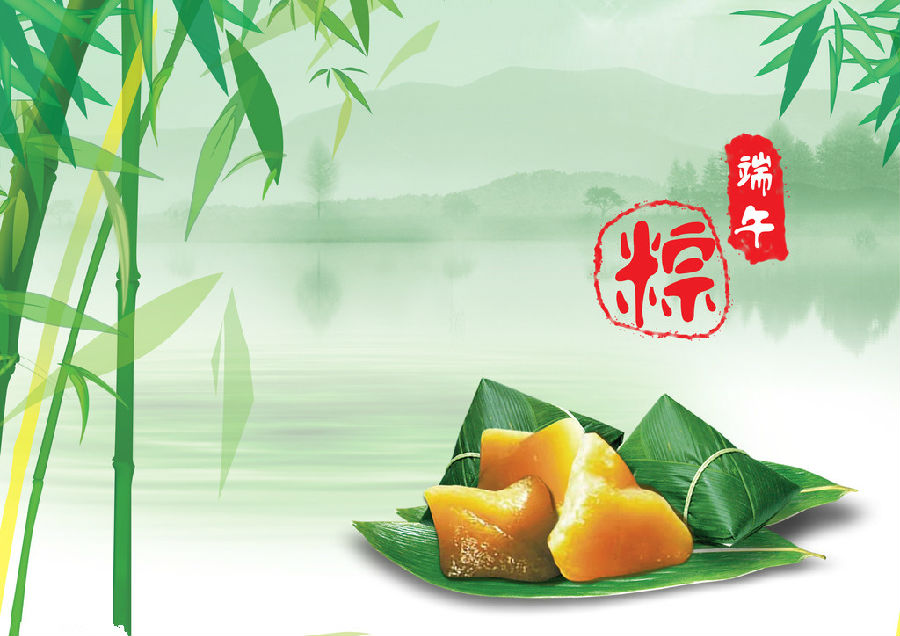(单词翻译:单击)
原味人文风情:
It's that time of year again. The lunar calendar's fifth day of the fifth month. Yup! It's Dragon Boat Festival time—eating zongzi, drinking pesticide, and, best of all, having a four-day weekend. Most people from the East and West know the basics of the story—a dude died, people made rice cakes, and then had a long weekend. But few know the true story. Ladies and gentlemen, introducing...Qu Yuan.
又到了一年中的那个时候了。农历第五个月的第五天。没错!是端午节的日子--吃粽子、喝杀虫剂,以及,最棒的是,拥有四天连假。大多数来自东方和西方的人都知道故事的基底--一位老兄死了、人们做米糕,然后就有个长假。但很少人知道真正的故事。各位女士先生,为您介绍...屈原。
Are you listening?
你有在听吗?
Qu Yuan was born in approximately 384 BC, in the area of China, which is now known Hubei. Aside from the fact he was born into an aristocratic family, not much is known about Qu Yuan's childhood. As an adult, he demonstrated an excellent memory and excelled in the art of diplomacy. He was so well regarded for his highly developed skills that he was appointed left minister to King Huai during the incredibly complex and convoluted Warring States period. As left minister, it was Qu's duty to advise the king on domestic affairs and royal orders, as well as entertaining guests and ministers from other states. Qu Yuan loved his kingdom and was devastated to discover that the government was becoming increasingly corrupted.
屈原约于公元前 384 年出生,在中国的一个地区,也就是现在所知的湖北。除了他生长在贵族世家的事实,屈原的童年鲜为人知。成人后,他展现绝佳的记忆力并在外交手段上高人一筹。他极度纯熟的技巧非常受到器重,因而被指派为楚怀王的左丞相,此时正处于极为错综复杂的战国时期。身为左丞相,屈原有责任在国事和皇室命令上忠告君王,同时也必须招待来自其他诸侯国的门客与丞相。屈原很爱他的国家,并在发现朝廷正日渐变得腐败后感到心力交瘁。
After the death of King Huai, the new king, Qingxiang, appointed his brother to the role of prime minister. The prime minister hated Qu Yuan and exiled him to the land south of the Yangtze River. It was during his exile that Qu Yuan began writing poetry. In total, Qu wrote about 25 noteworthy poems which mostly focused on his frustrations and despair with the increasing decline of his beloved kingdom. His sad prose poetry was so well regarded that it defined an entirely new style of Chinese poetry entitled "Chuci." Arguably his poem most representative of the style is Sorrow After Departure, which goes a little something like this...
楚怀王驾崩后,新的君主,楚顷襄王,指派他的弟弟为宰相。宰相厌恶屈原并放逐他到江南。正是在被流放期间,屈原才开始写诗。加总起来,屈氏写了约二十五首重要的诗词,多数着重在他对深爱的国家逐渐衰败感到的挫折与绝望。他悲伤的散体诗十分受到重视,更定义了一个叫做「楚辞」的全新中文诗体。可以说他在此体例中最具代表性的诗歌是「离骚」,内容大概是这样的...

During his many years of exile, Qu grew increasingly depressed at the now burgeoning downfall of his homeland, so much so that he could no longer stand the emotional despair and decided to end it all. He completed his magnum opus, titled Lament for Ying, then picked up a rock, waded into the Miluo River, and committed suicide. From here is where the legend of the Dragon Boat Festival begins. When people saw that Qu Yuan was committing suicide, they immediately took their boats to the river and raced to find his body. People also threw rice into the river as to prevent fish from trying to eat him. To fend off a water dragon who apparently lived in the river, an old doctor threw in a bottle of wine to get it drunk.
在他多年的流亡中,屈氏对于他的家乡正急速衰落,愈感消沉,严重至他再也无法忍受情感上的绝望并决定结束这一切。他完成他的巨作,题为「哀郢」,然后抱起一块岩石,涉水投汨罗江自尽。从这里开始就是端午节传说的起源。当人们看到屈原自尽,他们立即带着他们的船只到江边争相找寻他的遗体。人们也丢米饭进江水里以防止鱼群试图咬食他。为了抵御一只显然住在江里的蛟龙,一位老医生扔入一罈雄黄酒好让牠醉。
According to the official Beijing government website, a dragon-like fish floated to the surface with a piece of Yuan's clothing in its whiskers. Yes, the Beijing government website talks about dragons. That's awesome!
根据北京政府官方网站,一条长相似龙的鱼浮至水面,牠的胡须连带着一件屈原的衣服。是的,北京政府的网站谈论龙。酷毙啦!
What the website doesn't mention, though, is that after a few days, Qu came back as a ghost. Because apparently dragons are fine, but ghosts are impossible. Anyway. Some time later, Qu's ghost appeared before his friends. He told them that he died from drowning, not by dragon, and asked them to prepare glutinous rice wrapped in silk packages as an offering to the water dragon. These rice packages, now traditionally wrapped in bamboo leaves, are what we call zongzi. To commemorate the extreme patriotism and revolutionary poetry styles of Qu Yuan, the day of his death became Dragon Boat Festival. As this is an ancient story, details about how the story went down and even details regarding who the festival is celebrating changes, but Qu Yuan is popularly considered the true precursor.
但网站没有提及的是,几天后,屈氏以鬼魂的模样回来了。因为显然地,龙没有问题,但鬼魂是不可能存在的。管它的。一些时日后,屈氏的鬼魂出现在他朋友们面前。他告诉他们他是死于溺毙,不是因为龙,并请他们准备裹在丝袋中的糯米,作为蛟龙的供品。这些米包,现在传统上以竹叶包裹的,就是我们所谓的粽子。为了纪念屈原极度的爱国主义及革新的诗体,他逝世的日子成为端午节。因为这是一个古老的故事,故事发展的细节,甚至是关于节日颂扬对象的细节皆众说纷纭,但屈原普遍被认为是真正的先驱。
The festival does not only exist in China. In fact, many countries throughout Asia celebrate the Dragon Boat Festival. Hong Kong, Korea, Singapore, Vietnam all join in on the festivities. In China, its traditions are directly linked to the legend of Qu Yuan—eating the dragon's offering, zongzi, drinking the spirit that killed the dragon, realgar wine, which actually contains trace amounts of arsenic, it was originally used as pesticide. Seriously, do yourself a favor and don't drink it. And finally, in honor of those who searched for Qu Yuan's body, dragon boat racing became a competition. The sport of dragon boat racing has become so popular that it is practiced around the world. In China, the annual winners of the race are awarded with the prestigious Qu Yuan Cup.
这个节日不仅存在于中国。实际上,亚洲各地许多国家都庆祝端午节。香港、韩国、新加坡、越南都加入庆典活动。在中国,端午节庆的传统直接与屈原的传说连结--吃龙的供品,粽子、喝杀死龙的烈酒,雄黄酒,而它其实含有微量的砒霜,原本是用来当作杀虫剂的。讲真的,为了你好,别喝它吧。最后,为向那些找寻屈原遗体的人们致敬,划龙舟成为了竞赛。划龙舟体育竞赛变得非常受欢迎,全世界都在进行。在中国,每年的比赛优胜者能赢得声望极高的屈原杯。
This is honestly the thing I love most about Chinese history. There are so many weird stories about strange yet amazing people. A man from 300 BC wrote genre-defining poetry, kills himself, gets a dragon killed, and comes back as a ghost, and is nationally recognized with an agreed-upon festival. Also, luckily for me, since 2008, the Dragon Boat Festival has become an official public holiday, which means I can spend my weekend getting drunk in the bathtub.
这实在是我最爱中国历史的地方。有好多关于怪异但令人钦佩的人物的奇闻轶事。一位公元前三百年的男人写了定下新体材的诗歌、自我了断、让一条龙被杀死,然后以鬼魂之姿重返,受到一个国定假日的肯定。还有,对我来说很幸运地,自 2008 年,端午节已成为国定假日,这代表我可以用我整个周末在浴缸里喝茫。
So, there you have it. Thank you so much for watching another one of my videos. Don't forget to like, comment, and subscribe. If this is the first video of mine you've seen, welcome! And be sure to click on the link to check out my other history videos. The previous video was on Hong Xiuquan, Jesus's Chinese brother, who led the bloodiest event in modern history! Thanks again for watching. I'm WooKong and goodbye.
好啦,就是这样。非常感谢再次观看我又一支影片。别忘了按喜欢、留言,并订阅。如果这是你第一次看我的影片,欢迎你!记得要点击连结查看我过去其它影片。前一支影片是关于洪秀全,耶稣的中国籍兄弟,他领导了近代史上最血淋淋的一次事件!再次感谢收看。我是 WooKong,下回再见。


